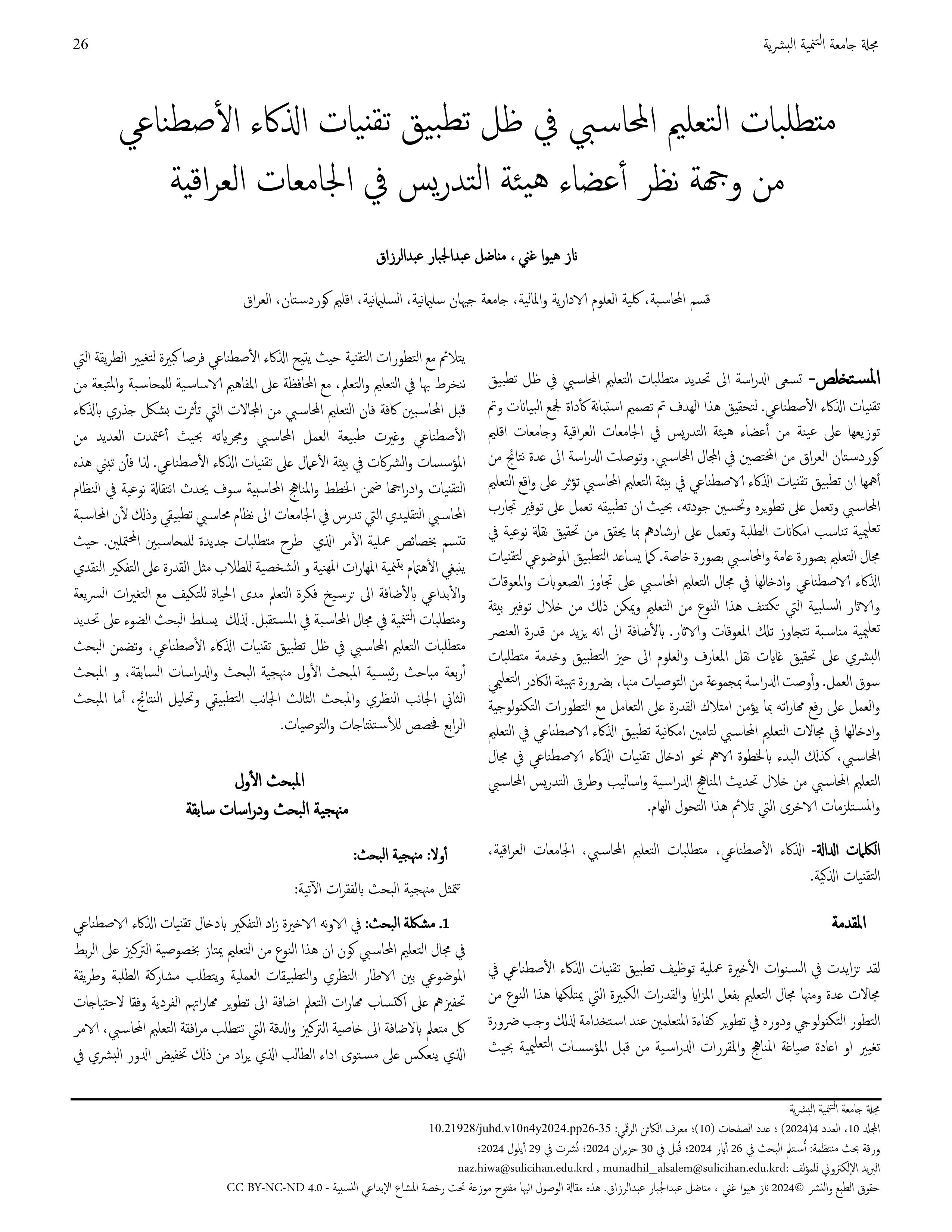The requirements of accounting education in light of the application of artificial intelligence techniques from the perspective of faculty members in Iraqi universities
DOI:
https://doi.org/10.21928/juhd.v10n4y2024.pp26-35Keywords:
artificial intelligence, accounting education requirements, Iraqi universities, Smart TechnologiesAbstract
The study seeks to identify the requirements of accounting education in light of the application of artificial intelligence (AI) technologies. To achieve this goal, a questionnaire was designed as a tool for data collection and was distributed to a sample of faculty members in Iraqi universities and universities in the Kurdistan Region of Iraq who specialize in the accounting field. The study reached several results, the most important of which are that the application of artificial intelligence techniques in the environment of accounting education affects the reality of accounting education and works to develop it and improve its quality, as its application works to provide educational experiences that suit the capabilities of students and work to guide them to achieve a qualitative leap in the field of education in general and accounting in particular. The objective application of artificial intelligence techniques in the field of accounting education helps to overcome the difficulties, obstacles and negative effects that surround this type of education and this can be done by providing an appropriate learning environment that overcomes these obstacles and effects. In addition, it increases the ability of the human element to achieve the goals of transferring knowledge and science to the field of application and serving the requirements of the labor market. The study recommended a set of recommendations, including the need to prepare the educational staff and work to raise their skills to ensure the ability to deal with technological developments and introduce them in the fields of accounting education to ensure the possibility of applying artificial intelligence in accounting education, as well as starting the most important step towards introducing artificial intelligence techniques in the field of accounting education by modernizing the curriculum, accounting teaching methods and other requirements that suit this important transformation.
References
أولا: المراجع العربية:
السقا، زياد هاشم، والحمداني، خليل ابراهيم (2013). دور التعليم الألكتروني في زيادة كفاءة وفاعلية التعليم المحاسبي. مجلة أداء المؤسسات الجزائرية، العدد (2).
الزاملي، علي عبدالحسين هاني (2016). التعليم المحاسبي ودوره في تطوير المهارات المهنية لخريجي قسم المحاسبة (دراسة استطلاعية لآراء عينة من أعضاء هيئة التدريس و خريجي قسم المحاسبة بجامعة القادسية(، مجلة الادارة والاقتصاد، جامعة القادسية، المجلد (3) العدد (12).
المهدي، مجدي صلاح طه (2021). التعليم وتحديات المستقبل فى ضوء فلسفة الذكاء الاصطناعى. مجلة تكنولوجيا التعليم والتعلم الرقمي، المجلد (2) العدد (5)، ص 140-97.
الشريدة، نادية عبدالجبار محمد، والسامرائي، عمار عصام عبدالرحمن (2021). الذكاء الأصطناعي في التعليم المحاسبي ودوره في تحقيق اهداف التنمية المستدامة في مملكة البحرين جامعة العلوم التطبيقية نموذجا. مجلة دراسات محاسبية ومالية (JAFS). جامعة بغداد ، المؤتمر العلمي الدولي/الوطني : الريادة و الإبداع في بناء السياسات و الإستراتيجيات المالية و المحاسبية في الوحدات الاقتصادية ص177-157
حسن، ايناس عبداللة، وعبداللة، سيزار صالح (2020). متطلبات التعليم المحاسبي الجامعي في ظل التوجه نحو تبني معايير الأبلاغ المالي الدولية (IFRS) دراسة ميدانية في جامعات اقليم كوردستان – العراق. مجلة العلوم الانسانية لجامعة زاخو، المجلد (8) العدد (3).
زروقي، رياض، وفالتة، أميرة (2020). دور الذكاء الأصطناعي في تحسين جودة التعليم العالي. المجلة العربية للتربية النوعية، المجلد (4) العدد (12).
شحاتة، نشوى رفعت محمد (2022). توظيف تطبيقات الذكاء الأصطناعي في العملية التعليمية. المجلة العلمية المحكمة للجمعية المصرية للكمبيوتر التعليمي، المجلد (10)، العدد (2).
عجيلة، محمد، وقنيع، أحمد (2016). مساهمة التعليم المحاسبي الإلكتروني في تنمية مهارات طلبة أقسام المحاسبة. المجلة الجزائرية للدراسات المحاسبية والمالية، العدد (3).
عبداللة، هوار فتحي، وسعيد، لقمان محمد (2023). انعكاسات تطور التعليم المحاسبي على تحسين الأداء المهني دراسة استطلاعية لآراء عينة من الاكاديميين والمهنيين. مجلة بوليتكنيك للعلوم الأنسانية والأجتماعية، المجلد (4) العدد (1).
محمد، فتح الالة محمد احمد (2016). مدى التوافق بين التعليم المحاسبي في الجامعات السودانية ومتطلبات بيئة الاعمال المعاصرة والاتحاد الدولي للمحاسبين من وجهة نظر أرباب الاعمال وأعضاء هيئة التدريس. المجلة العربية لضمان جودة التعليم الجامعي، المجلد (9) العدد (23).
محمد، أكرم أحمد، وخضر، كارزان عدنان، وعبداللة، هةريم أحمد (2019). التحديات التي تواجه التعليم المحاسبي في جامعات اقليم كردستان- دراسة استطلاعية لعينة من الجامعات. مجلة جامعة كوية للعلوم الانسانية والاجتماعية، المجلد (2) العدد (1).
مزياني، نور الدين، وشريقي، عمر (2017). مدى توافر متطلبات الكفاءة في خريجي المحاسبة بالجامعات الجزائرية وفقا للمعايير الدولية للتعليم المحاسبي- دراسة ميدانية. المجلة العربية للمحاسبة، المجلد (20) العدد (1)، ص 108-73.
ثانيا: المراجع الأجنبية:
Andani, G., Lindrianasari, L., Oktavia, R., & Septiyanti, R. (2022). INDONESIAN ACCOUNTING STUDENTS’SELF-CONFIDENCE TO ADOPT ARTIFICIAL INTELLIGENCE (AI). Jurnal Akuntansi dan Keuangan Indonesia, 19(1), 2.
Brabete, V., Barbu, C. M., Cîrciumaru, D., Goagără, D., & Berceanu, D. (2024). Redesign of Accounting Education to Meet the Challenges of Artificial Intelligence–A Literature Review. The AMFITEATRU ECONOMIC journal, 26(65), 275-275.
Chen, L., Chen, P., & Lin, Z. (2020). Artificial intelligence in education: A review. Ieee Access, 8, 75264-75278.
Nunnally, J. C. (1978). Psychometric Theory 2nd Edition, p226 McGraw Hill.
Sekaran, U. (2003) Research Methods for Business: A Skill-Building Approach. 4th Edition, John Wiley & Sons, New York.
Sudaryanto, M. R., Hendrawan, M. A., & Andrian, T. (2023). The Effect of Technology Readiness, Digital Competence, Perceived Usefulness, and Ease of Use on Accounting Students Artificial Intelligence Technology Adoption. In E3S Web of Conferences (Vol. 388, p. 04055). EDP Sciences.

Downloads
Published
How to Cite
Issue
Section
License
Copyright (c) 2024 Naz Hiwa Ghani, Assistant Prof. Munadhil Abduljabar Alsalim

This work is licensed under a Creative Commons Attribution-NonCommercial-NoDerivatives 4.0 International License.


